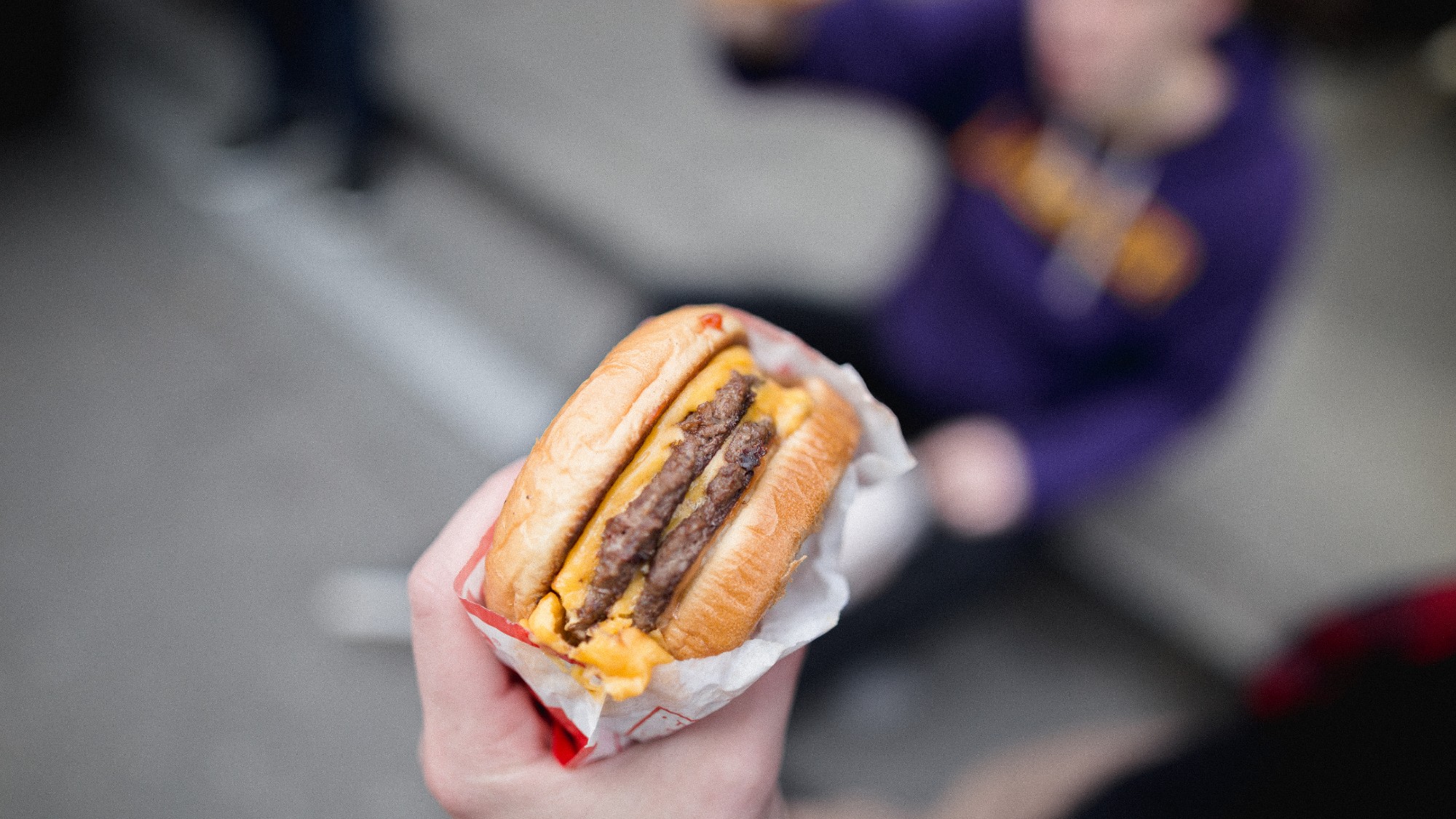The cookbook as spiritual autobiography
What new cookbooks by Alton Brown and Anthony Bourdain are really about


Alton Brown and Anthony Bourdain are the two most cerebral TV food celebrities and they appeal to a similar type of person: the over-thinking foodie. They have also recently put out cookbooks — Brown's Everyday Cook, and Bourdain's Appetites — that are quite similar in their concept and execution. Indulge me.
First, there are the superficial similarities: Each uses a handwritten font at the top of each recipe. Brown makes exclusive use of Instagram-inspired overhead photography, while Bourdain's book makes generous use of the same challenging angle. I can report immediately that these are handsome books with tasty recipes inside.
But they aren't just cash-grab cookbooks by celebrities, where a name and photo is slapped on an intern's recipes. I buy into the conceit that behind each book is a culinary snapshot of the author. But cameras are dangerous things when we turn them on ourselves. And these books differ in one crucial respect: Perhaps inadvertently, one of them documents an author's spiritual enlightenment and the other documents a dark night of the soul.
Subscribe to The Week
Escape your echo chamber. Get the facts behind the news, plus analysis from multiple perspectives.

Sign up for The Week's Free Newsletters
From our morning news briefing to a weekly Good News Newsletter, get the best of The Week delivered directly to your inbox.
From our morning news briefing to a weekly Good News Newsletter, get the best of The Week delivered directly to your inbox.
Before we get to that, first a few words about cookbooks and these authors. There are a few familiar genres of cookbooks. There is the restaurant cookbook, in which chefs at a hot joint try to help you recreate their dishes at home; Bourdain has done one of those in his Les Halles cookbook. There is the television show cookbook; Brown has done a series of those from Good Eats. And there is the "at home" cookbook, which is what these two are.
The chef-at-home category has become an interesting one lately, as many world renown chefs and TV cooks include essays in them, often dripping in personal guilt, about the fundamental goodness of hospitality and home-cooking. They take this "art" to be endangered by food TV itself or the pressures of an increasingly prosumer attitude about home cooking. They are stalked by the fear that we are replacing home cooking with silly competition shows or simply making it more intimidating than it should be. The ultimate version of this is the lovely My Family Table, a 2011 effort by New Orleans celebrity chef John Besh, which brims with idyllic photos of his very Instagram-able family and his idiosyncratic recommendations for home-cooked meals.
Brown and Bourdain would probably describe themselves as mere cooks, not chefs. Each of them have used food TV to explore other topics. In 14 seasons of Good Eats on the Food Network, Alton Brown used science to explore cooking and eating. And he used food to explore nature through science. In his various shows across networks, Bourdain has used eating as a way to explore world culture and history, or at least the current events of exotic locales. Both of these men put evident care into what they do and they each seek out some kind of authenticity, even as they are pointing you to the artifice that goes into their work. Both of them are aesthetes. Brown, a would-be auteur, supervised most of the shooting and storyboarding himself on his show, which had the precision of a German clock. Bourdain has, over time, assembled a traveling crew and the resources to put together one of the most astonishingly beautiful shows on television.
It is delusional to say so, but the power of television is such that I feel that I have a personal relationship with these two men. Maybe it is because I would binge-watch their shows on iTunes while rocking my infant daughter to sleep. But for years, I have admired them. I was a latchkey kid who had to start cooking for myself at age 12. These men have helped me feed a family of my own as an adult. And they are models for a certain kind of media career that I want.
Brown managed to model his religious faith and convictions in a TV and media world where they are an outlier, while being somewhat self-deprecating and subtle about it. His Good Eats persona was not just that of an obsessive, DIY tinkerer; his production of the show evidenced the same thing. Brown comes off as someone who could have been good at anything he tried. In a podcast interview with, of all people, Giada De Laurentiis, he manages to completely disarm his subject, and get an astonishing personal interview with her. I can imagine him as as a U.S. ambassador who successfully avoided nuclear holocaust with a well-timed joke about Latvian sausage aimed at his Russian counterpart.
Bourdain manages to be cultured in a way that is rapidly going out of style. In a world that has suddenly turned more dogmatic and angsty about everything, Bourdain is easy-going, curious, and generous with the opinions of his guests, even when he disagrees and even when they may be disconcerting. There was a pro-gentrification marital arts instructor in San Francisco and a Turkish businessman who didn't mind authoritarianism so long as living standards went up. Or the descendant of Piedmontese immigrants to Germany who thinks Angela Merkel's invitation of refugees to Germany is a disaster. I don't think Bourdain agrees with any of that, but it's cool and counter-cultural to let it all out on a slick show.
I'm still struggling to achieve Brown's subtlety and precision or Bourdain's looseness and generosity. But as mentors, these men have served me well.
I tend to use Bourdain recipes on Sunday nights. His roast chicken recipe became my starting point for that dish. His coq au vin makes a few appearances there too each year. Brown tends to show up in my galley kitchen on Friday nights. I've used his Good Eats pizza dough recipe with great success. His fish tacos and fish and chips recipes land on those nights too.
So you can imagine how interested I was in these self-portraits.
The conceit of each of these books is that these recipes are what the authors use at home. You get the sense that, like a photo-shoot in Architectural Digest, the version of life you see is slightly cleaned up from the reality. Bourdain's book presents a home kitchen that is turning out versions of his French bistro background, and a daughter-pleasing dish of ratatouille. (She loves the cartoon film.) Bourdain gives advice on hosting parties: Be humble and sensible enough to have pigs in a blanket on hand. Everyone eats them; they aren't messy. He walks people through how to prepare for Thanksgiving days ahead time. Bourdain occasionally refers to his "dark days" of substance abuse which were documented in other books. Bourdain used to pose around as a kind of "Bad Santa" in the cooking world.
But there is something fundamentally joyful about this book, like the author finally bought into all the happy talk about food as a service to guests and one's family that goes along with tracking shots on his show. Which is good, because it is true. He is a father and a bit of a bon vivant. His version of naughtiness is now playful. There's a picture of his friend Eric Ripert with a white sauce splashed on his chin, that invites a dirty joke. But there's also pictures of his daughter, and a great deal of fatherly worry throughout. This is a man who is comfortable in his own skin. Although he is agnostic, there is something about his approach that is deeply in tune with the religious attitude toward food in Latinate cultures. One of the images of heaven in the Bible is an outrageous banquet overseen by a loving father. I highly recommend his recipe for a roast beef po' boy or the calf's liver with bacon, leeks, apples, and calvados.
Brown's book also has excellent food in it. A vegetarian-friendly "Thanksgiving salad" of roasted sweet potatoes, red onions, and cinnamon-flavored quinoa has become an autumn lunch staple in my home and will remain so forever. The recipes move freely between metric and standard measures, fitting his nerdy side. In promotional podcasts, Brown has described the book as a self-portrait. If people don't like the book, they don't like him, he has mused aloud. The fact that he and his team personally photographed all the dishes with an iPhone 6S actually makes it more like a "selfie." And he's there in it. There are little references to his love for great film. Beside the tantalizing close-ups of the food, there are glimpses of his bespoke clothing and a favorite sports car's gear shift.
There is a recipe for overnight oats in Brown's book that must be authentic to his life. I've had it several times now — the portion is extremely precise and small. The ingredients are heavy on super foods like chia seeds. It's a delicious little dish that says to the world: If I'm going to fit into bespoke suits for another decade, I have to count my macros. There is something austere about some of the recipes. Exactly the right approach for an achiever.
But Brown is no dummy. He is releasing a self-portrait during a time in his life that is obviously tumultuous. Fans and admirers like myself can't help but have noticed. The references to spiritual authors like Max Lucado were replaced some time ago in Brown's media channels with little allusions to other lifestyle experiments: Tough dieting, interest in veganism, suddenly heavy drinking, workaholism. Many recipes throughout the book look almost like allusions to these recent experimental phases. Is that Thanksgiving salad a vegan's substitute for a real family meal?
In a recent profile at The New York Times it was noted that Brown had been through divorce, and the divorce also meant exile from his church. "I think I've built a life that's based on running away from my life," he said to the journalist, in a shockingly cogent self-diagnosis. A man going through this thought it was time to give us a self-portrait? Brown is clearly a man who is searching, but whose spiritual formation was both too deep and too intellectual to allow him to be satisfied with the normal goo-goo spirituality that celebrities tend to embrace.
Yes, Brown's book is fun and nerdy, and attractive, and overflowing with good recipes. Just like he is. But something else comes through too: pathos. Some of the photographs that are intended to look "fun" and indulgent take on a slightly sinister, self-critical double meaning. In Bourdain's book, there are photos of a happy daughter. You can sense the presence of family and friends around him in the prose and photos. In Brown's we have a portrait of a man with impeccable taste, surrounded by his dearly acquired finery. And the only other human presence we feel are those of his assistants and collaborators at work. On the cover he is superficially enjoying a little nosh. But contemplate it more and you see a man who is sharing his bed with nothing other than his French fries. Ecce homo. I can't help but believe this double meaning was intended by the author.
These books are portraits of their authors. And I should have known they could be little novels hidden in disguise. Man is a walking, talking thin-skinned sack of meat. So of course there is spiritual significance in a sausage. These are great cookbooks. But those with ears to hear will find so much more in them.
Sign up for Today's Best Articles in your inbox
A free daily email with the biggest news stories of the day – and the best features from TheWeek.com
Michael Brendan Dougherty is senior correspondent at TheWeek.com. He is the founder and editor of The Slurve, a newsletter about baseball. His work has appeared in The New York Times Magazine, ESPN Magazine, Slate and The American Conservative.
-
 America's favorite fast food restaurants
America's favorite fast food restaurantsThe Explainer There are different ways of thinking about how Americans define how they most like to spend their money on burgers, tacos and fried chicken
-
 Law: The battle over birthright citizenship
Law: The battle over birthright citizenshipFeature Trump shifts his focus to nationwide injunctions after federal judges block his attempt to end birthright citizenship
-
 The threat to the NIH
The threat to the NIHFeature The Trump administration plans drastic cuts to medical research. What are the ramifications?
-
 Walter Isaacson's 'Elon Musk' can 'scarcely contain its subject'
Walter Isaacson's 'Elon Musk' can 'scarcely contain its subject'The latest biography on the elusive tech mogul is causing a stir among critics
-
 Welcome to the new TheWeek.com!
Welcome to the new TheWeek.com!The Explainer Please allow us to reintroduce ourselves
-
 The Oscars finale was a heartless disaster
The Oscars finale was a heartless disasterThe Explainer A calculated attempt at emotional manipulation goes very wrong
-
 Most awkward awards show ever?
Most awkward awards show ever?The Explainer The best, worst, and most shocking moments from a chaotic Golden Globes
-
 The possible silver lining to the Warner Bros. deal
The possible silver lining to the Warner Bros. dealThe Explainer Could what's terrible for theaters be good for creators?
-
 Jeffrey Wright is the new 'narrator voice'
Jeffrey Wright is the new 'narrator voice'The Explainer Move over, Sam Elliott and Morgan Freeman
-
 This week's literary events are the biggest award shows of 2020
This week's literary events are the biggest award shows of 2020feature So long, Oscar. Hello, Booker.
-
 What She Dies Tomorrow can teach us about our unshakable obsession with mortality
What She Dies Tomorrow can teach us about our unshakable obsession with mortalityThe Explainer This film isn't about the pandemic. But it can help viewers confront their fears about death.